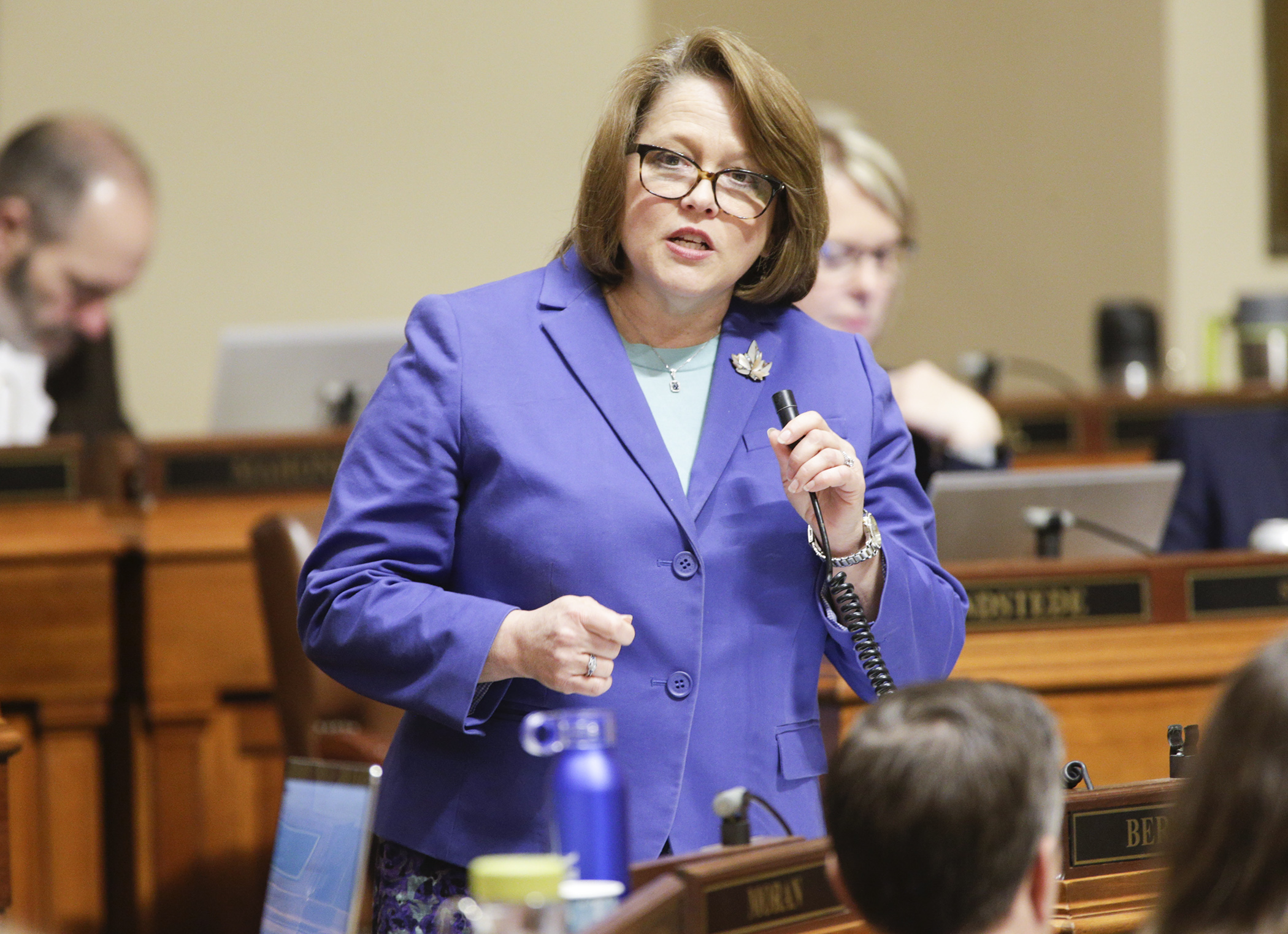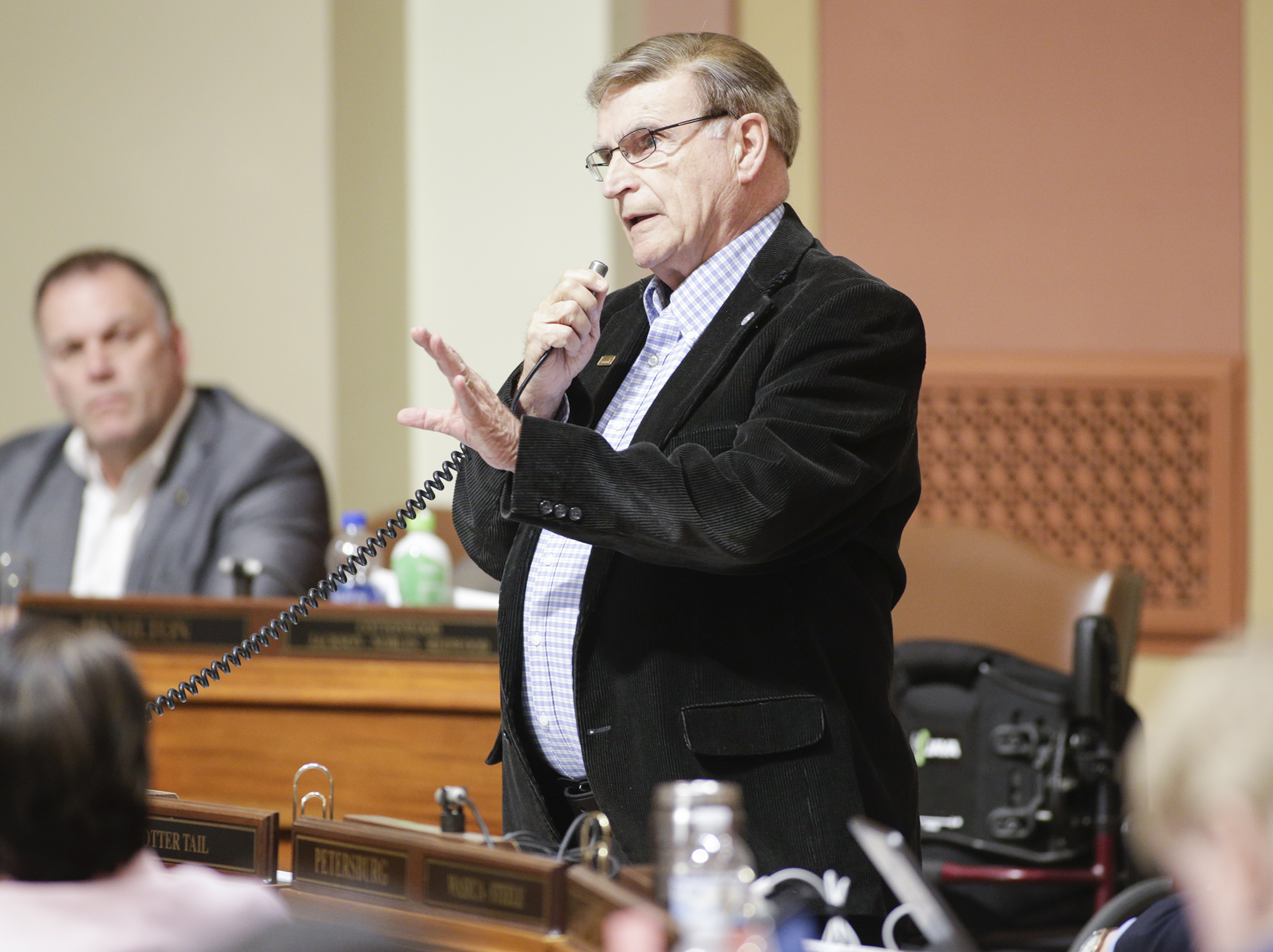Touting tuition freeze and grants increase, House passes omnibus higher ed bill
After burning the midnight oil like college students cramming for finals, House members returned to the floor at midday Tuesday to debate the omnibus higher education finance bill. And, after some discussion about who should be eligible for state grants and the process for choosing University of Minnesota regents, the bill passed, as amended, 72-57.
HF2544/SF2415*, amended to include House language, contains only minor changes from what was approved by the House Higher Education Finance and Policy Division April 9. Sponsored by Rep. Connie Bernardy (DFL-New Brighton) and Sen. Paul Anderson (R-Plymouth), it would appropriate $3.57 billion in the 2020-21 biennium to the Minnesota State system, University of Minnesota, Office of Higher Education – which administers state financial aid programs – and the Mayo Foundation for Mayo Medical School and family and residency programs.
 Rep. Connie Bernardy, chair of the House Higher Education Finance and Policy Division, comments during floor debate on the omnibus higher education finance bill before it was passed 72-57. Photo by Paul Battaglia
Rep. Connie Bernardy, chair of the House Higher Education Finance and Policy Division, comments during floor debate on the omnibus higher education finance bill before it was passed 72-57. Photo by Paul BattagliaIn telling stories of students in crisis, Bernardy emphasized the level of student debt for Minnesotans, which she said has reached $27.1 billion.
“This is an economic crisis for not only students, but families, too,” Bernardy said. “That is why we are funding a tuition freeze at the University of Minnesota and in the Minnesota State system. That’s why there’s an additional $35 million for the student grant program, with the average increase in grants of $400 per student. … Our higher education bill provides a brighter, equitable and prosperous future for Minnesotans.”
The largest recipient of the bill’s appropriations would be the Minnesota State system, which would receive $1.6 billion over the next biennium, while the University of Minnesota’s appropriation would be $1.42 billion. The outlay for the Office of Higher Education would be $544.5 million – including $412.1 million for state grants -- and $2.7 million would go to the Mayo Foundation.
Among new programs established by the legislation would be an Aspiring Minnesota Teachers of Color scholarship program, student teacher candidate grants in shortage areas, a student loan debt counseling program, and a hunger-free campus designation.
A bone of contention between members was language that would add to the state grants received by students without full citizenship. Such students have the amount of federal Pell grants deducted from their state grants, even though they’re not eligible for Pell grants.
While neither an amendment offered by Rep. Mary Franson (R-Alexandria) nor one from Rep. Eric Lucero (R-Dayton) addressed that program specifically, their amendments would have made non-citizens ineligible for in-state tuition levels and mandated that they be the first to lose their grants in the event of funding cuts.
“Student citizens are hurt by the preference given to students who are here illegally,” Franson said. “Tuition is simply a bridge too far.”
Both amendments were defeated, as were two by Rep. Linda Runbeck (R-Circle Pines). One would have mandated that the University of Minnesota keep administrative costs under 15 percent of total expenditures, while another would create a “student debt projection tool” for students in the Minnesota State system.
 Rep. Bud Nornes offers and amendment to the omnibus higher education finance bill, during floor debate April 30. The bill passed 72-57. Photo by Paul Battaglia
Rep. Bud Nornes offers and amendment to the omnibus higher education finance bill, during floor debate April 30. The bill passed 72-57. Photo by Paul BattagliaTwo amendments sponsored by Rep. Bud Nornes (R-Fergus Falls) would have set a specific biennial deadline for the election of University of Minnesota Board of Regents and required the Speaker of the House to offer a public explanation if such deadlines were not met. They were also defeated, as was one sponsored by Rep. Dave Baker (R-Willmar) that would have created a task force to revisit the method by which regents are chosen. Bernardy countered that such a change would require a constitutional amendment.
The amendment that provoked the lengthiest discussion was unsuccessfully offered by Rep. Nick Zerwas (R-Elk River). It would have eliminated the $4 million appropriated to the MN Reconnect program to assist adults in returning to college and instead give its appropriation to Minnesota Independence College and Community, a post-secondary program for students on the autism spectrum and with developmental disabilities. Bernardy spoke in favor of funding both programs.
One amendment was successful: Rep. Ginny Klevorn (DFL-Plymouth) moved that an appropriation for a direct care service corps pilot program be transferred from the budget of the Office of Higher Education to the Minnesota State system.
While praising the House Higher Education Finance and Policy Division on which he was the Republican lead, Nornes said of the bill: “We’re not doing anything to lower the cost of higher education. We’re paying for it instead of the students. … The tuition freeze is a band-aid.”
Related Articles
Search Session Daily
Advanced Search OptionsPriority Dailies
Ways and Means Committee OKs proposed $512 million supplemental budget on party-line vote
By Mike Cook Meeting more needs or fiscal irresponsibility is one way to sum up the differences among the two parties on a supplemental spending package a year after a $72 billion state budg...
Meeting more needs or fiscal irresponsibility is one way to sum up the differences among the two parties on a supplemental spending package a year after a $72 billion state budg...
Minnesota’s projected budget surplus balloons to $3.7 billion, but fiscal pressure still looms
By Rob Hubbard Just as Minnesota has experienced a warmer winter than usual, so has the state’s budget outlook warmed over the past few months.
On Thursday, Minnesota Management and Budget...
Just as Minnesota has experienced a warmer winter than usual, so has the state’s budget outlook warmed over the past few months.
On Thursday, Minnesota Management and Budget...